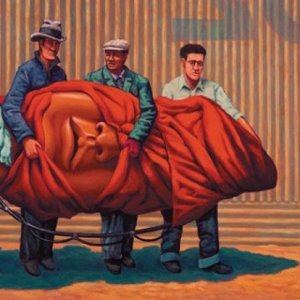
"Very lonely people that I met... they all hallucinated ants at one time."
-- Mido, Oldboy
To paraphrase Posdnous, fuck being hard, The Mars Volta's complicated. This is not a positive trait on its own (see: Ulysses; Joyce, James), but with the right talent it can be a beautiful thing (see: Pollack, Jackson; Lynch, David; Killah, Ghostface).
Over the course of their young career, The Mars Volta have achieved such beauty. 2003's De-Loused in the Comatorium is an album of exceptional merit, despite Rick Rubin's Phil Spectoresque over-production; and Frances the Mute (2005), produced by lead guitarist and composer Omar Rodriguez Lopez, could have been an indulgent exercise in tediousness (certainly the formula was there; like Tolkien's ents, these cats never say anything unless it's worth taking a long time to say) were it not for its utter perfection, musically and vocally.
And that's what separates The Mars Volta from your average pretentious "art rock" band. Maybe they're abstract for abstraction's sake, their often morbid lyrics impossible to decipher. Maybe. For most groups such causes would, and do, effect near-universal scorn and ridicule -- and those sentiments would perhaps be justifiably aimed at The Mars Volta were it not for their transcendental musical gifts and Cedric Bixler-Zavala's amazing vocal skills.
Let's talk about Bixler-Zavala for a sec. At times reminiscent of Rush's Geddy Lee, at others Janis Joplin, though mostly of his own, uniquely talented self, Bixler-Zavala's gender bending vocals are Thomas Mann Death In Venice-level seductive. He sings (screams, wails...) like a seafarer-luring Siren, unrestrained, unrestricted, as though he's an actor in a 70's era psychedelic musical. And anyone who's heard him on Handsome Boy Modeling School's White People knows he's barely shown the extent of his vocal diversity. Simply put, he's the Lebron James* of rock vocalists: his potential is unlimited, and nobody's really aware of what Herculean heights he's capable.
That extends to the band's core as a whole. The Mars Volta's sound hasn't changed drastically over the course of three albums, and yet it has. Like Bowie, The Mars Volta are evolving slowly, and on Amputechture they stick to their signature sound while, like a virtuoso chef, also encorporating new spices. The Latin music influences which MSG'd up Frances the Mute return (albeit less blatantly), as does the rest of the band's formidable repertoire, plus some jazz, some industrial dustiness, and a pretty Spanish-language track which not only showcases the group's musical diversity, but also serves as a perfect bridge between the first and second halves of the album.
Recommending Amputechture, however, is sort of like recommending Auschwitz as a vacation destination. It's significant, essential, but it doesn't exactly cry out "fun for the whole family." Amputechture is a dark place to go, a scary ride; but for anyone who appreciates The Mars Volta's talents, it's a dark comfortable place.
To wit, anyone familiar with my well-documented torment by, and fear of, bugs probably won't be surprised to learn that Amputechture's theme is, ostensibly**, insects. Bixler-Zavala's lyrics read like an entomological dictionary eaten then regurgitated by some Lovecraftian monster. And while it's repulsive, Amputechture is, for all the reasons mentioned above, also wonderfully pretty and enticing.
Like a spider's web. Like a bank robbery. Like discount sushi.
Amputechture is possibly the year's best album. Certainly it's the year's most terrifying. If you're like me, that is.
Rating: 4/5 earwigs
* I mean Dwyane Wade.
** That kid is back on the escalator again!

No comments:
Post a Comment